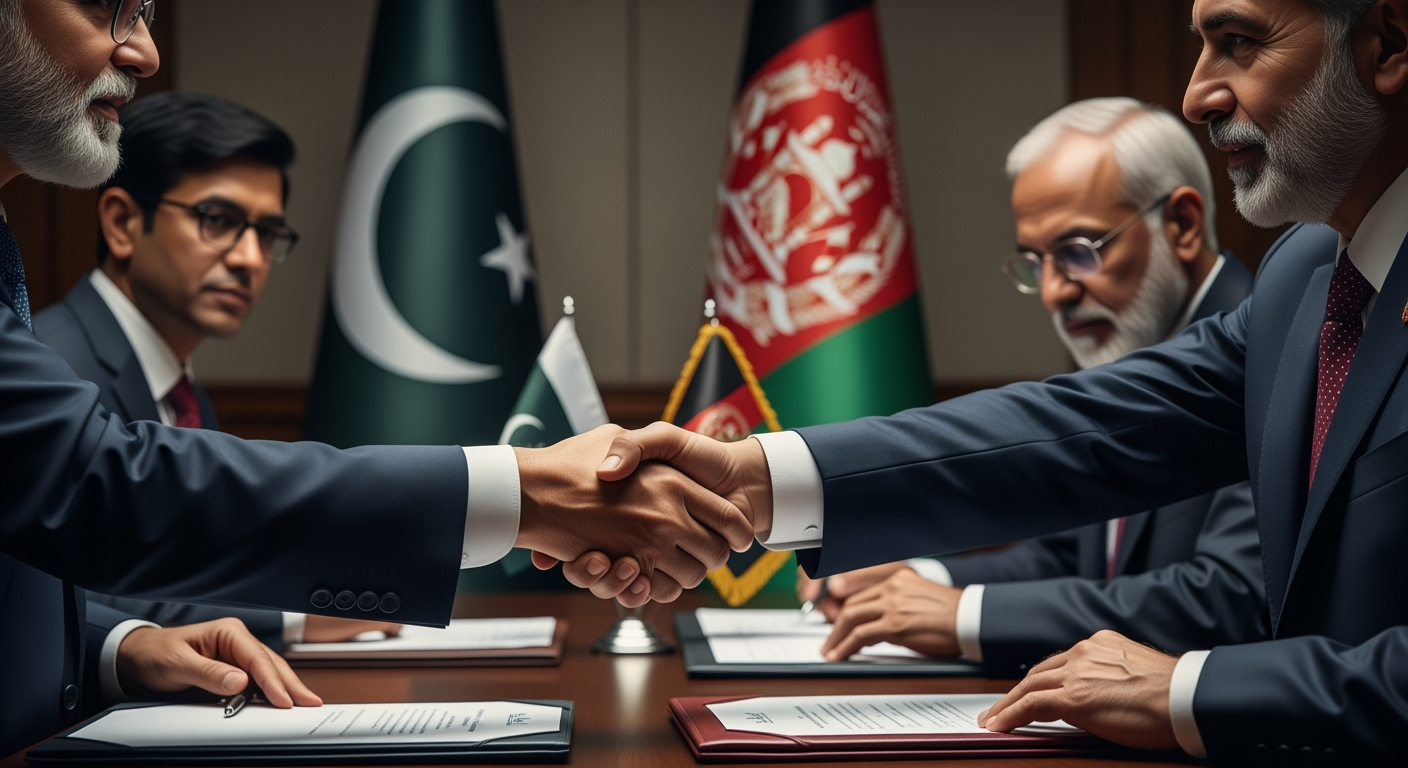Related Articles

Brazil Greenlights Offshore Oil Drilling Near Amazon Mouth Amid Environmental Outcry

Historic White House East Wing Demolition Underway for New Ballroom





DOHA, QATAR – Pakistan and Afghanistan have agreed to an immediate ceasefire following high-level talks in Doha, Qatar’s Ministry of Foreign Affairs announced late Saturday. The breakthrough comes after a week of intense cross-border clashes that claimed dozens of lives and raised fears of a wider regional conflict. The agreement, mediated by Qatar and reportedly involving Turkey, aims to halt hostilities and establish mechanisms for lasting peace and stability between the two neighboring nations.
The accord was reached during a round of negotiations held in the Qatari capital, where delegations led by the defense ministers and intelligence chiefs from both countries convened to address the escalating crisis. Pakistan's delegation included Defense Minister Khawaja Asif and intelligence chief General Asim Malik, while Afghanistan’s was headed by Defense Minister Mohammad Yaqoob. Qatar's Foreign Ministry indicated that follow-up meetings are planned for the coming days to ensure the sustainability of the ceasefire. This diplomatic engagement represents a critical step toward de-escalation after a period marked by significant military action and accusations from both sides.
The path to Saturday's ceasefire was fraught with violence. The agreement follows a particularly deadly week that saw a rapid intensification of cross-border skirmishes. Tensions had soared after a series of deadly blasts in Afghanistan, with Kabul blaming Islamabad for the attacks. In retaliation, Pakistan conducted airstrikes in Afghanistan, targeting what it identified as militant hideouts linked to the Tehrik-i-Taliban Pakistan (TTP). Afghan authorities, in turn, accused Pakistan of violating its territorial integrity and an earlier, fragile 48-hour ceasefire that had been established earlier in the week.
This cycle of violence resulted in a significant human toll. At least 37 civilians were killed and 425 wounded during the week-long hostilities across border provinces, including Paktia, Paktika, Khost, Kunar, Kandahar, and Helmand, according to a report by the UN Assistance Mission in Afghanistan (UNAMA). Pakistan also confirmed that 23 of its soldiers died during the initial clashes. Reports emerged of civilians fleeing their homes in border areas, fearing a broader conflict. The escalation brought the long-standing mistrust between the two countries to a dangerous peak, with both sides accusing the other of harboring or failing to curb militant groups operating across their shared border.
The recent clashes are rooted in a complex history of border disputes and mutual accusations regarding cross-border militancy. A primary point of contention is the Durand Line, a 2,640-kilometer (1,640-mile) border demarcated in 1893 that divides modern Afghanistan and Pakistan. Afghanistan does not officially recognize this line as the international border, leading to persistent tensions.
Pakistan has consistently accused the Afghan Taliban government of providing sanctuary to the Tehrik-i-Taliban Pakistan (TTP), also known as the Pakistani Taliban, a militant group responsible for numerous attacks within Pakistan. Islamabad's foreign ministry explicitly stated that the Doha talks aimed to "end cross-border terrorism against Pakistan emanating from Afghanistan and restore peace and stability along the Pak-Afghan border." Pakistan is reportedly seeking written assurances and a defined timeline from the Taliban to take action against the TTP and its affiliates. Conversely, the Afghan Taliban government denies these allegations, maintaining that it does not permit its territory to be used for attacks against other countries. This fundamental disagreement over the presence and activities of militant groups remains a significant hurdle to durable peace.
Qatar's role as a neutral mediator has been pivotal in bringing Pakistan and Afghanistan to the negotiating table. Doha has cultivated a reputation as a key facilitator in Afghan affairs, having hosted the Taliban's political office for eight years. This long-standing engagement positioned Qatar as a natural choice to mediate the recent high-stakes talks, providing a trusted platform for dialogue between historically distrustful parties.
The Qatari Ministry of Foreign Affairs' public announcement of the ceasefire underscores its commitment to regional stability and its established diplomatic influence. While other international actors, including Malaysia, have also offered mediation efforts in the ongoing crisis, Qatar's consistent engagement with the Taliban and its diplomatic infrastructure in Doha have proven instrumental in fostering such crucial discussions.
While the immediate ceasefire offers a crucial respite, the path to a lasting peace remains complex and challenging. The agreement to establish mechanisms for peace and stability and schedule follow-up meetings signals a commitment to sustained dialogue. However, the core issues, particularly Pakistan's demands for firm action against the TTP and Afghanistan's non-recognition of the Durand Line, present significant obstacles.
Previous attempts at ceasefires and peace talks between various factions in the region have often been fragile and short-lived. The success of this latest agreement hinges on the willingness of both sides to address their fundamental grievances constructively and implement agreed-upon measures. The humanitarian situation in the border regions, coupled with the instability caused by militant groups, necessitates a durable resolution. The international community will closely watch whether this Qatari-brokered ceasefire can evolve into a more comprehensive framework for stability, transforming a deeply troubled relationship into one founded on mutual respect and peaceful coexistence.